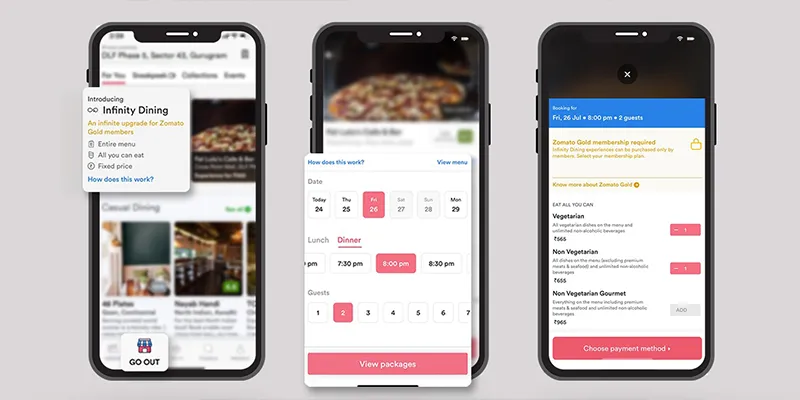Zomato launches new all-you-can-eat programme 'Infinity Dining'
When Zomato shut down loyalty programme PiggyBank, the foodtech startup said it is working on a major upgrade in its customer loyalty programmes. Perhaps, 'Infinity Dining' is it.
What if you could have an all-you-can-eat experience at any restaurant? Well, fret not because Zomato Infinity Dining is here.
The Gurugram-based food delivery startup on Friday announced its new customer loyalty programme called ‘Infinity Dining’ at select restaurants where customers will be charged per person and can eat and drink all they want from the menu.
This will be launched at around 350 restaurants, which are rated higher than 3.5 in Delhi, Mumbai, and Bengaluru. It will be available exclusively to Zomato Gold subscribers, who can book for their friends and family members.
“The programme gives restaurants the opportunity to introduce diners to the entire menu, and diners the option to explore new dishes and flavours,” the startup said in a statement.

Gaurav Gupta, Chief Operating Officer and Co-founder of Zomato said,
“Dining out constitutes about 70 percent of a restaurant’s total business. While Zomato Gold continues to be instrumental in driving sales for restaurants and adding value to subscribers, we realise that the opportunities in this sphere are endless.”
Infinity Dining will also provide customers access to the open bar at a fixed price. At the same time, Zomato urges users to wine and dine responsibly, and avoid food wastage.
The foodtech company is the first in India to offer unlimited dining options. It claims that its existing subscription programme Zomato Gold has grown almost 100 percent in the last eight months.
Earlier this month, it shut down its loyalty programme PiggyBank, which allowed frequent users to save on food delivery orders but members can continue using the ‘Z coin’ till August 12.
At the time, the startup said that it was working on a major upgrade in its customer loyalty programme.
Founded in 2008, Zomato has over 1.25 million subscribers across nine countries including India, the UAE, Portugal, Australia, New Zealand, Lebanon, Turkey, Philippines and Indonesia.
(Edited by Saheli Sen Gupta)










